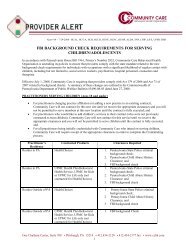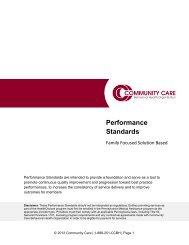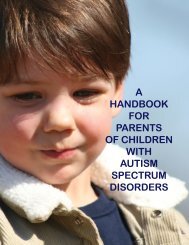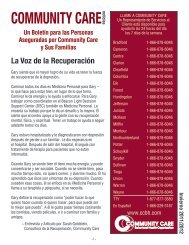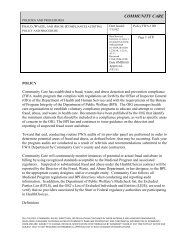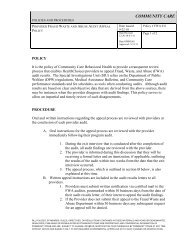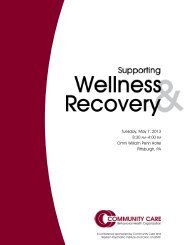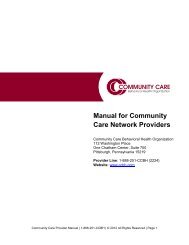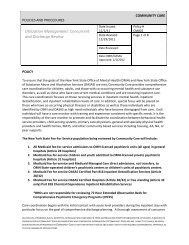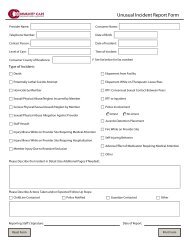a handbook for parents of children with autism spectrum disorders
a handbook for parents of children with autism spectrum disorders
a handbook for parents of children with autism spectrum disorders
You also want an ePaper? Increase the reach of your titles
YUMPU automatically turns print PDFs into web optimized ePapers that Google loves.
APPENDIX E:<br />
LEVELS OF CARE/<br />
TREATMENT AVAILABLE<br />
and returns to his or her primary residence daily.<br />
School-Based Partial Hospital Programs (SBPH) — SBPH provides licensed mental health partial<br />
hospital services <strong>for</strong> select <strong>children</strong> and adolescents <strong>with</strong> serious emotional and mental health needs.<br />
These programs can take place in an approved private school and/or an alternative setting such as an<br />
outpatient provider. Placement in such settings is normally initiated by the student’s home school district<br />
when the district can no longer effectively meet the student’s education needs <strong>with</strong>in its programs.<br />
Students in SBPH programs have Individualized Educational Plans as well as <strong>for</strong>mal mental health<br />
treatment plans covering the range <strong>of</strong> strengths, needs, and goals <strong>of</strong> the programs.<br />
Outpatient Services — These types <strong>of</strong> services include a range <strong>of</strong> short-term and long-term treatments<br />
which vary <strong>with</strong> the child’s diagnosis, severity <strong>of</strong> illness, coping skills, and available support systems.<br />
Outpatient treatment may include medication evaluations, medication management, individual therapy,<br />
family therapy, and group therapy, and may include treatments such as positive behavior support, social<br />
skills, cognitive based interventions, and communication. Group therapy may be particularly beneficial<br />
<strong>for</strong> <strong>children</strong> and adolescents <strong>with</strong> ASD when the focus <strong>of</strong> the group is to enhance communication<br />
and social skill development. While the range <strong>of</strong> Autism-specific outpatient programs differs widely<br />
in different geographic areas, the development <strong>of</strong> such programs continues to be a focus <strong>of</strong> many<br />
providers statewide.<br />
Resource Coordinator (RC) — This individual helps to link families to services, identifies appropriate<br />
supports/resources including both mental health and educational settings, aids in transportation to and<br />
from medical/psychiatric appointments, and identifies community supports.<br />
Intensive Case Manager (ICM) — An ICM is very similar to an RC and can link families to services,<br />
identify appropriate supports/resources including both mental health and educational settings, aid<br />
in transportation to and from medical/psychiatric appointments, identify community supports, and<br />
monitor medication compliance. Children involved <strong>with</strong> an ICM have access to 24-hour on-call ICMs <strong>for</strong><br />
assistance in a mental health crisis.<br />
Crisis Services — These services may be accessed through a medical or psychiatric hospital<br />
emergency room or crisis center or via a mobile crisis team. A mobile crisis team provides individual or<br />
team-delivered intervention in the member’s home, school, work, or community to address the crisis<br />
situation. Regardless <strong>of</strong> the method <strong>of</strong> crisis intervention, the main goal <strong>of</strong> crisis services is to establish<br />
safety, provide stabilization, and divert hospitalization when possible.<br />
- Page 37 -



